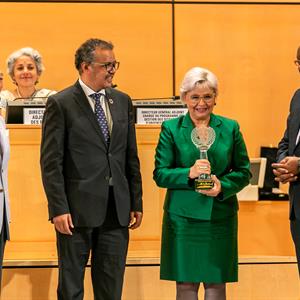When people stop Dr Quesada on the streets of San Jose, Costa Rica, pushing cash into her hands for ‘her’ children, she thanks yet disagrees. She does take the money for the Pro Palliative Care Unit Foundation, but states: "No, these are not my children. They are not even the children of their families. They are everyone’s children – the children of our entire nation. We all have the responsibility to make the time they still have in this world as easy, painless, joyous and gentle as possible."
When she shares this vision with delegates from WHO Member States, in her acceptance speech for the Sasakawa award, her voice bridles and she stops, then the plenary hall bursts in applause.
After her studies in USA, she returned to her country as a young doctor and dedicated her career to pediatric palliative care, to help the dying, so that they are treated with respect, professionalism and love, leading her to found the Foundation.
But then this is yet another perception that Dr Quesada passionately denies. "No way to frame us as a group of people dealing with death. No, we work to celebrate life! Our patients are not corpses, they are still living young human beings! We are relentless to make their lives better and the lives of their close ones, in the time that remains."
Dr Quesada made it her own way to create a system for pediatric palliative care. She spoke on popular TV shows, so people started recognizing her on the street. She spoke with a first lady of Costa Rica – who could not give money, but helped the health ministry and Dr Quesada make the case. The national children pediatric hospital welcomed her to start off a work that was never done before. She spoke with UNICEF and got all their old office furniture, which is how she started the offices of the Foundation.
A holistic approach, where every detail matters
The everyday, real work of the Foundation is impressive in its scope, scale and quality.
"Palliative care includes physical, medical, social, spiritual and psychological support," Dr Quesada explains. "We worry about and take care of every aspect of lives of children patients, their families, as well as the doctors and nurses who often would not know what to do."
The self-help support group of bereaved families brings together hundreds of parents whose children have died and do not know where to go and what next in their lives.
Professional counselling and support is provided to the close ones of patients with advanced illnesses without prospects for a positive response to any treatment. The teams also serve children whose life conditions progressively deteriorate because of the illness, so they increasingly fall into full dependency on their parents, caregivers, and the health personnel. The Foundation also works in cases when a healing treatment is possible, but could fail, when a premature death might occur, when an intensive treatment could prolong a good quality of life, or when the treatment is exclusively palliative and it could be extended for several years.
The Foundation’s day-care centres are a place for patients and their families to receive medical, spiritual, social and psychological support, nursing care, entertainment and games, and special therapies.
With the home visits, regardless of location, the visiting teams of doctors and nurses provide any possible necessary support and advice. The Foundation also gives medical equipment on loan or for free, and its teams are available at any moment for hospital and emergency care.
"We could cover even more families and more children, in more places," says Dr Quesada. "Costa Rica has a socialized medical system, covering 98% of the population and residents. Everyone is eligible to have his/her medical expenses covered, and everyone contributes to the social security. This is not insurance," she explains in a passionate manner. "We have had universal health coverage for years, it is even enshrined in our constitution! If an expensive medication is refused to you, you can go to the constitutional court and it would confirm your right to receive it. Our health system works and it is an example for the world."
Elsewhere, more children to help
Dr Quesada has a vision. "Costa Rica is number one in Latin America in palliative pediatric care, but this is to be shared. I want to teach all people and colleagues in other countries to do the same."
Her dream is to build a facility that would have many functions, such as hospices for children to die there, residence for doctors and nurses from Costa Rica as well as other countries, so that they can learn, and go back home to countries with no palliative pediatric care system. "They will help us in reaching more children, across Latin America."
The money from the Sasakawa Award will be used for this vision.

